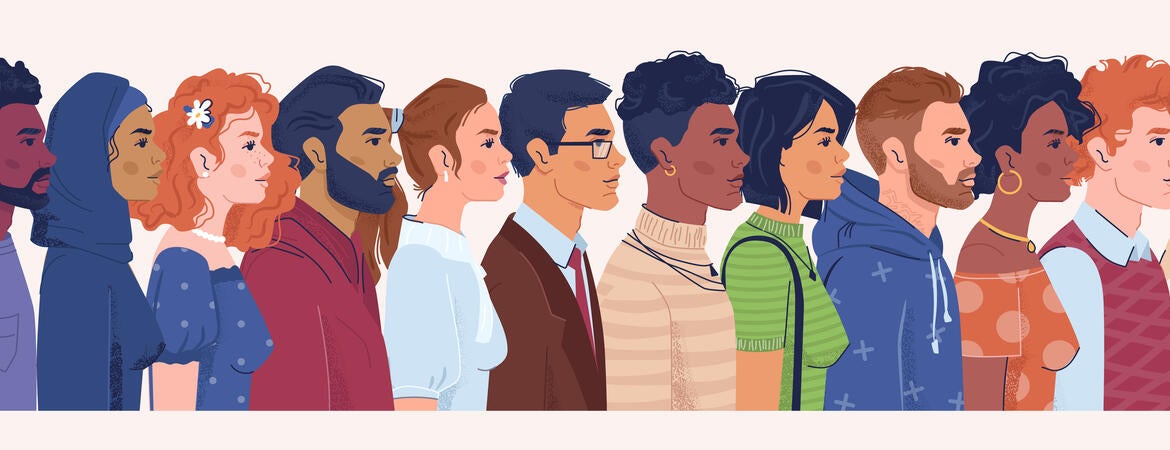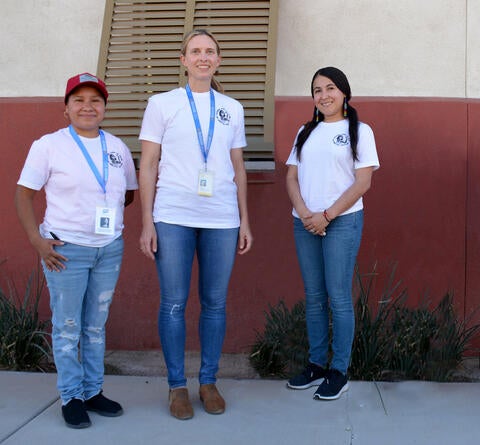
Although everyone has been affected by COVID-19 and the pandemic it spawned, not all populations have been affected equally. In the United States, for example, COVID-19 cases and death rates have been disproportionately high in Latino and Indigenous populations.
To understand how determinants of health affect perceptions of the coronavirus, its spread, and decision making around COVID-19 testing and vaccination in vulnerable populations, a team of researchers at the University of California, Riverside, conducted a study in the Eastern Coachella Valley region of inland Southern California, home to Latino and Indigenous Mexican farm-working communities.
Led by Ann Cheney, an associate professor of social medicine, population, and public health in the School of Medicine, the team reports in a paper published in BMC Public Health that these immigrant populations are vulnerable to inequalities that increase their risk of COVID-19 exposure, morbidity, and mortality.
“Common themes that emerged across seven focus groups we conducted include misinformation, lack of trust in institutions, and insecurity around employment and residency,” Cheney said. “Our study shows clearly that the pandemic amplified historically rooted structural inequities and social factors that shape health disparities among marginalized communities of color. Minority groups disproportionately have chronic medical conditions and have poor access to healthcare.”
Cheney and her colleagues carried out the study from August 2020 to January 2021 and used community-based participatory research. The team conducted six focus groups in Spanish and one focus group in Purépecha, a language spoken among indigenous Latin Americans in the Mexican state of Michoacán. Fifty-five people participated, all of whom self-identified as either Hispanic/Latino and/or Purépecha. More than a third of the participants identified as farm workers.
“Most participants felt affected by the coronavirus due to reduced work hours and income, inability to work or no work, childcare responsibilities, and COVID-19 infection,” said Daniel Gehlbach, the first author of the research paper and a fourth-year medical student. “Themes of misinformation as well as insecurity and fear linked to concerns about employment and deportation came up in discussions across our focus groups. It was clear that exclusion, discrimination, and violence shape attitudes in Eastern Coachella Valley about the coronavirus and its spread, influencing behaviors regarding COVID-19 testing and vaccination and, ultimately, increasing risk for COVID-19 exposure.”
The Coachella Valley, an area of racial-ethnic disparity identified as a hotspot when the pandemic began, encompasses nine cities and rural agricultural communities. Many Latino and Indigenous Mexican immigrants in the region live below the poverty line and work in the nearby agricultural fields.
“Interventions are urgently needed here to address distrust in both government and public health among this population, which would help decrease structural vulnerabilities,” Cheney said. “Eastern Coachella Valley residents suffer health disparities due to low income and education, limited English proficiency, and undocumented status. It should come as no surprise the pandemic severely impacted this population.”
Key findings of the study are that many Eastern Coachella Valley residents:
- Have limited access to the internet and may not have access to reliable public health sources for information regarding COVID-19. Many rely on word of mouth or social media platforms.
- Lack reliable and trustworthy information sources in Spanish and Purépecha leading some to believe they would get infected by going to testing sites.
- Experience employment insecurity, shaping decision making around COVID-19 testing and fears of job loss if testing positive.
- Are insecure about using COVID-19 testing services because of their immigration and citizenship status. Participants noted fear of being identified as undocumented at testing and vaccination sites are significant concerns among Latino and Indigenous Mexican farm-working communities.
- Have limited confidence in government entities. Participants talked about community perceptions of the government and public health working together to harm minority groups. This lack of trust in institutions extends to hospitals and the healthcare system.
“One way to build trust in government institutions and the healthcare system is to engage those most vulnerable to COVID-19 in decision-making around public health outreach and service delivery,” Cheney said. “Positive COVID-19 messages from providers and trusted members of the community, such as community health workers or promotores de salud, increases vaccine acceptance. When medical leaders and trusted community members promote COVID-19 testing and vaccination it can positively shape COVID-19 decisions.”
Cheney calls for more attention to be paid to delivering public health information and news in ways that are accessible to culturally and linguistically diverse communities, particularly underserved and marginalized communities who may not be proficient in English and have limited access to broadband internet connection.
“We encourage sharing COVID-19 material with vulnerable Latinx communities through community and ethnic media sources such as print, radio, and television,” she said. “A printable community report we prepared is available in English and Spanish.”
Cheney and Gehlbach were joined in the study by community investigator María Pozar, co-investigator Evelyn Vázquez, graduate and medical students Gabriela Ortiz, Erica Li, Cintya Beltran Sánchez, and community health worker Sonia Rodríguez.
The study was supported by grants from the Desert Healthcare District & Foundation and the National Institutes of Health Community Engagement Alliance (CEAL) initiative.
The title of the paper is “Perceptions of the Coronavirus and COVID-19 testing and vaccination in Latinx and Indigenous Mexican immigrant communities in the Eastern Coachella Valley.”
Header image credit: Sensvector, iStock / Getty Images Plus.




